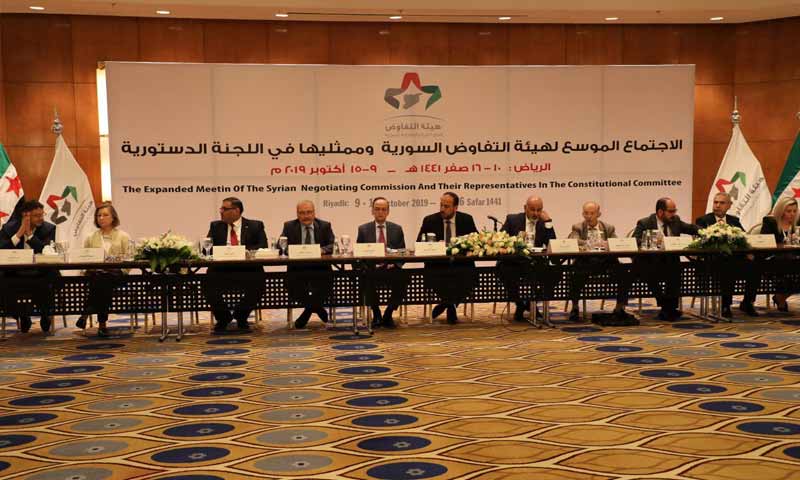The Syrian High Negotiations Committee (HNC) has seen divisions arise among its members on their positions towards Turkey’s military operation against the Kurdish People’s Protection Units (YPG) in al-Jazira.
The HNC consists of several opposition platforms: the Cairo Platform, the Moscow Platform and the Riyadh Platform, as well as members of the National Coordination Committee for Democratic Change, independent oppositional figures and representatives of other opposition factions.
On 10 October, the Cairo Platform rejected the military offensive in the Eastern Euphrates according to a statement obtained by Enab Baladi. “The military offensive is another war waged in Syria, leading to more casualties, especially among civilians, and more waves of displacement and migration,” according to the statement. The Cairo Platform maintained that “the offensive will hinder the political track that all national political forces had been working to strengthen and to bring to light.”
The platform called for an immediate cessation for the military operation, known as “Operation Peace Spring” by Turkey. It also demanded that opposition forces play a part in the political dialogue between the Turkish state and Kurdish political parties and fighters, under the auspices and support of the Arab League and the international community, refusing any forced demographic changes in Syria.
The People’s Will Party, led by the head of Moscow Platform of Syrian opposition, Qadri Jamil, issued a statement on 9 October describing the Turkish militay intervention as a “blatant aggression”. The party called for an immediate end to the Turkish offensive and for Turkey to commit to work within the format of the Astana Talks and the frameworks of international law.
The party’s statement declared that “the Kurdish issue can be resolved within the framework of Syrian dialogue and the political process regulated by the United Nations Security Council Resolution 2254. This is the only way to preserve Syria’s sovereignty, unity and territorial integrity.”
The Riyadh Platform, led by the head of the HNC, Nasr al-Hariri, did not issue any statement to support or condemn Turkey’s military operation.
However, Nasr al-Hariri, through his Twitter account, supported the Turkish military offensive and the efforts made to create a safe zone in the Eastern Euphrates.
تنظيم حزب العمال الكردستاني تنظيم إرهابي لا يختلف عن داعش والقاعدة والميليشيات الايرانيةوإن إنشاء المنطقة الآمنة حلم قديم متجدد للسوريين سيساهم في جلب الاستقرار ومواجهة التنظيمات الارهابية والسماح بعودة المهجرين واللاجئين من أهالي تلك المناطق والدفع باتجاه الحل السياسي في سورية .
— د.نصر الحريري (@Nasr_Hariri) October 7, 2019
“The Kurdistan Workers’ Party (PKK) is a terrorist organization, not different from ISIS, al-Qaeda and Iranian militias. Moreover, the establishment of the safe zone in Syria is a renewed old dream for Syrians. It will contribute to bringing stability and countering terrorist organizations, allowing the return of the displaced people and refugees to their areas as well as pushing for a political solution in Syria,” al-Hariri stated.
The (HNC) convened an expanded meeting in Riyadh, Saudi Arabia, to discuss the matters of the constitutional committee. Riyad has been critical of the Turkish offensive.
The Military Delegation of the Syrian Revolutionary Forces to the Astana Talks supported the military operation, which aimed at “recovering the usurped territories to their people.” It also backed the implementation of the safe zone to which “millions of Syrians can return,” according to the delegations statement posted on its Twitter account.
Turkey launched the military operations on on 8 October, after the U.S pulled back its forces from the border region. Turkish forces along with Turkish-backed Syrian troops began a ground offensive on several posts near Tel Abyad, north of Raqqa.

